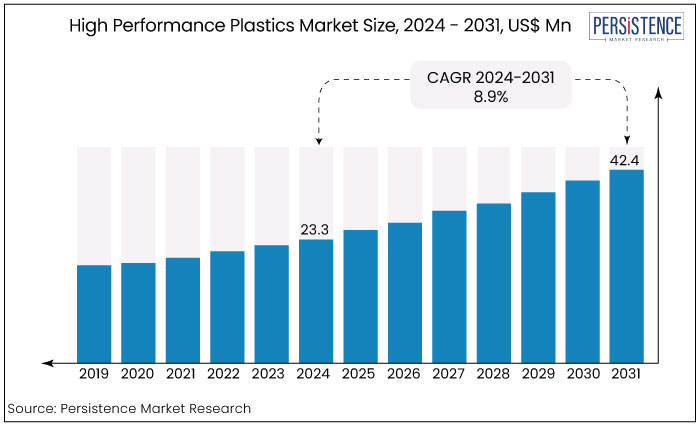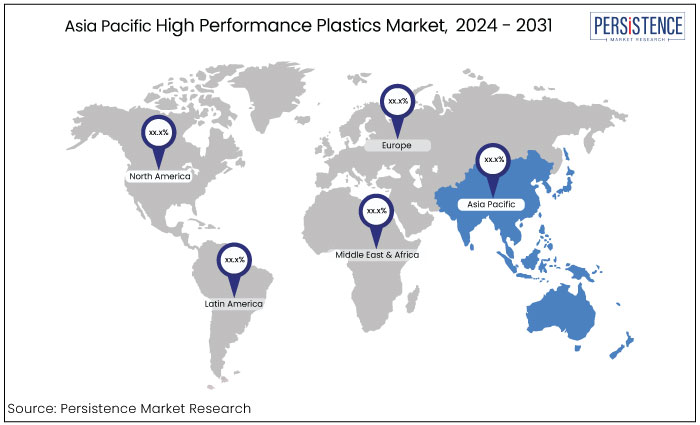Industry: Chemicals and Materials
Published Date: October-2024
Format: PPT*, PDF, EXCEL
Delivery Timelines: Contact Sales
Number of Pages: 185
Report ID: PMRREP34855
The high performance plastics market is estimated to increase from US$23.3 Mn in 2024 to US$42.4 Mn by 2031. The market is projected to record a CAGR of 8.9% during the forecast period from 2024 to 2031. The industry is witnessing significant growth driven by advancements in material technology, and the adoption of high performance plastics in emerging applications like renewable energy and electric vehicles.

Key Highlights of the Market
|
Market Attributes |
Key Insights |
|
High Performance Plastics Market Size (2024E) |
US$23.3 Mn |
|
Projected Market Value (2031F) |
US$42.4 Mn |
|
Global Market Growth Rate (CAGR 2024 to 2031) |
8.9% |
|
Historical Market Growth Rate (CAGR 2019 to 2023) |
6.7% |
Asia Pacific emerges as lucrative market high performance plastics and is expected to maintain this dominance throughout the forecast period. This growth is closely linked to the area's booming electrical and electronics industry.
Countries like India and China, which are recognized as the significantly growing economies with the high populations globally have seen a surge in demand for electronic devices driven by their expanding populations over recent years. This surge has created significant opportunities for new and established manufacturers of cutting-edge electrical and electronic products.
Manufacturers face heightened pressure to meet consumer demands. Additionally, high performance plastics are essential in producing semiconductors and compact microprocessors, as they enhance lifespan due to their exceptional chemical resistance.

North America is projected to experience significant growth in the high performance plastics market by 2031. This surge can be attributed to the region's high disposable income and a strong consumer preference for superior quality raw materials.
Countries like the United States boast the high per capita income in the area creating a demand for transportation manufacturers to provide exceptional products. As a result, the utilization of high performance plastics has seen a remarkable increase throughout the region.
Government initiatives and various organizations are actively promoting automobile manufacturers' use of safe and durable materials. This focus on enhancing material quality aims to improve vehicle safety and ultimately protect lives in the event of accidents, reinforcing the importance of high-performance plastics.
The market is categorized into different types including fluoropolymers, polyamides, polyphenylene sulfide (PPS), sulfone polymers (SP), liquid crystal polymers (LCP), and more. Among these, fluoropolymers stand out due to their exceptional performance, driving significant demand across various sectors, from transportation to healthcare.
Renowned for their outstanding chemical properties, fluoropolymers are often regarded as the most effective non-reactive materials available today. Key varieties of fluoropolymers like polyvinylidene fluoride (PVDF) and polyvinyl fluoride (PVF) excel in diverse industrial applications. For example, polytetrafluoroethylene (PTFE) is favored for non-stick cookware and coatings, thanks to its high melting point, durability, and resistance to chemicals.
Other applications of fluoropolymers include wire insulation, lithium-ion battery packaging, and biomedical implants showcasing their versatility and industry-wide adoption potential.
The market is classified into transportation, electrical and electronics, industrial, medical, and others based on end-use industry. The transportation sector is experiencing significant growth, primarily due to the extensive use of high performance plastics in manufacturing automobile components and insulation. These materials provide exceptional chemical and temperature resistance, along with superior electrical performances.
Fluoropolymers, in granular and powder foam forms are particularly beneficial in extrusion and compression molding processes. Compared to standard plastics, extruded or compressed high performance plastics offer numerous advantages such as enhanced flexibility, reduced weight, and increased reliability in vehicles. This innovative use of materials is revolutionizing the automotive industry making vehicles efficient and durable while meeting modern performance standards.
High performance plastics are advanced polymer materials engineered to withstand extreme conditions, including high temperatures, chemical exposure, and mechanical stress. These plastics use unique molecular structures to provide enhanced strength, durability, and resistance compared to traditional plastics.
Commonly used in aerospace, automotive, electronics, and medical industries, high performance plastics are ideal for applications requiring lightweight, high-strength materials that can operate under demanding conditions. Their versatility allows for critical components such as insulation, seals, and structural parts, making them indispensable in modern manufacturing and technology.
The industry is witnessing significant growth, driven by advancements in material technology, an increasing focus on sustainability, and the adoption of high performance plastics in emerging applications like renewable energy and electric vehicles. These factors and high performance plastics market trends are driving the expansion. The future promises potent growth fueled by innovation and the ongoing quest for efficiency and performance in various industries.
The high performance plastics market has highlighted continued growth with a CAGR of 6.7% during the period from 2019 to 2023. This growth can be attributed to rising demand from key sectors such as aerospace, automotive, and electronics, where the need for lightweight and durable materials is paramount.
The market is projected to accelerate with an expected CAGR of 8.9% during the period from 2024 to 2031. Factors driving this upward trajectory include increasing demand for lightweight and durable materials across various industries. Notable trends include the rise of bioplastics, emphasizing sustainability and environmental responsibility alongside advancements in recycling technologies.
Innovations in additive manufacturing are also shaping the landscape, allowing customized applications and reducing material waste. Furthermore, the aerospace and automotive sectors increasingly incorporate these materials to enhance fuel efficiency and performance. At the same time, the electronics industry seeks lightweight solutions for improved device functionality, opening new high performance plastics market opportunities for expansion.
Increasing Demand in Aerospace and Defense
The aerospace and defense sectors are significant drivers for the growth of high performance plastics market. As aircraft manufacturers seek to reduce weight and improve fuel efficiency, high performance plastics offer an ideal solution due to their lightweight yet durable properties. These materials withstand extreme temperatures and harsh environmental conditions, making them suitable for aircraft components, such as interiors, fuel tanks, and structural elements.
The ongoing advancements in aerospace technology and the push for more fuel-efficient and environmentally friendly aircraft are propelling demand for these specialized plastics. As global air travel continues to rise and defense spending increases, the aerospace and defense industries will remain pivotal in driving the growth of the high performance plastics market.
Technological Advancements in Material Science
Technological advancements in material science play a crucial role in driving the high performance plastics market growth. Continuous research and development efforts have led to the creation of innovative polymer formulations that enhance the performance and properties of these materials. For instance, heat resistance, chemical stability, and mechanical strength improvements have expanded high-performance plastics' applications in various industries.
Additionally, advancements in manufacturing techniques, such as additive manufacturing and precision molding, enable the production of complex geometries and customized solutions that meet specific industry requirements. As industries increasingly adopt these cutting-edge materials to optimize performance and efficiency, the demand for high performance plastics is expected to grow significantly in the coming years.
Growing Focus on Sustainability
The growing focus on sustainability is emerging as a significant growth driver for the high performance plastics market expansion. As industries seek to minimize their environmental impact, there is a rising demand for eco-friendly materials and processes. High-performance plastics, especially bioplastics, are gaining traction due to their potential for reduced carbon footprints and improved recyclability.
Many manufacturers are adopting sustainable practices by integrating recycled materials into their production processes, further enhancing the appeal of high-performance plastics. Additionally, industries such as automotive are increasingly prioritizing lightweight materials to improve fuel efficiency and reduce emissions. This shift toward sustainability is driving innovation in high performance plastics and positioning these materials as essential components in the transition toward a more sustainable future.
High Production Costs
One significant factor impeding the market growth is the high production costs associated with these advanced materials. The manufacturing processes for high performance plastics often require specialized equipment and technology leading to increased operational expenses.
The raw materials used in producing these plastics can be expensive than those for conventional plastics. This cost barrier can deter smaller manufacturers from entering the market and limit the widespread adoption of high performance plastics in cost-sensitive industries. As a result, the overall growth potential of the market may be constrained by these financial challenges.
Limited Recycling Options
Another challenge hindering the high performance plastics market growth is the limited recycling options available for these materials. Many high performance plastics are engineered for specific applications, which can make them difficult to recycle or repurpose. The lack of established recycling infrastructure and processes for these specialized plastics can lead to increased waste and environmental concerns.
As sustainability becomes a priority for many industries, the inability to effectively recycle high performance plastics may hinder their acceptance and growth. This limitation poses a significant barrier to market expansion as companies seek more sustainable material alternatives.
Use in the Renewable Energy Sector
One promising future opportunity for the high performance plastics market lies in the expansion of the renewable energy sector. As the world increasingly shifts toward sustainable energy solutions, high performance plastics can play a vital role in the development of advanced technologies such as wind turbines, solar panels, and energy storage systems. These materials are lightweight, durable, and corrosion-resistant making them ideal for components that withstand harsh environmental conditions.
The use of high performance plastics in the manufacturing of wind turbine blades can enhance efficiency while reducing overall weight. Additionally, as governments and corporations invest in renewable energy infrastructure, the demand for high performance plastics is expected to surge presenting significant growth potential for manufacturers in this sector.
Growth in Electric Vehicles (EVs)
The rise of electric vehicles (EVs) presents a substantial opportunity for the high performance plastics market concentration. As automakers strive to enhance the efficiency and performance of EVs, the demand for lightweight and high-strength materials is increasing.
High performance plastics can significantly reduce vehicle weight, improving battery efficiency and extending driving range. Moreover, these materials are ideal for various components including battery housings, interior parts, and thermal management systems, which require superior heat resistance and electrical insulation.
With the global push for clean transportation and the growing adoption of EVs, the high performance plastics market is well positioned for robust growth allowing manufacturers to innovate and cater to this expanding segment.
The competitive landscape of the high performance plastics market is characterized by key players leveraging innovation to enhance their product offerings. Companies like Dupont have introduced advanced materials such as Zytel™ LCPA, a high-performance polyamide designed for automotive applications, launched in 2022. This product focuses on weight reduction and improved fuel efficiency.
BASF has developed Ultradur® B4300, a high-performance polyester suitable for various industrial applications, emphasizing enhanced durability and thermal stability. These innovations reflect the industry's commitment to meeting diverse demands across sectors like aerospace, automotive, and electronics, while maintaining a competitive edge through technological advancements and sustainable practices.
Recent Developments in the High Performance Plastics Market
|
Attributes |
Details |
|
Forecast Period |
2024 to 2031 |
|
Historical Data Available for |
2019 to 2023 |
|
Market Analysis |
US$ Million for Value |
|
Key Regions Covered |
|
|
Key Market Segments Covered |
|
|
Key Companies Profiled |
|
|
Report Coverage |
|
|
Customization & Pricing |
Available upon request |
By Type
By End-use Industry
By Region
To know more about delivery timeline for this report Contact Sales

The market is predicted to rise from US$23.3 Mn in 2024 to US$42.4 Mn by 2031.
Some of the leading players in the market are Solvay, BASF SE, Arkema, Evonik Industries, and DuPont.
Fluoropolymers stand out due to their exceptional performance driving significant demand across various sectors.
Asia Pacific dominates the market due to the booming electrical and electronics industry.
The continuous research and development presents a key opportunity for the market players.